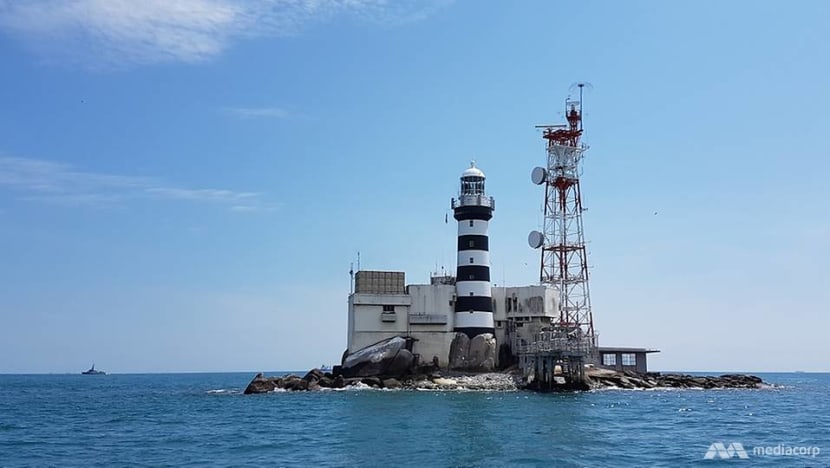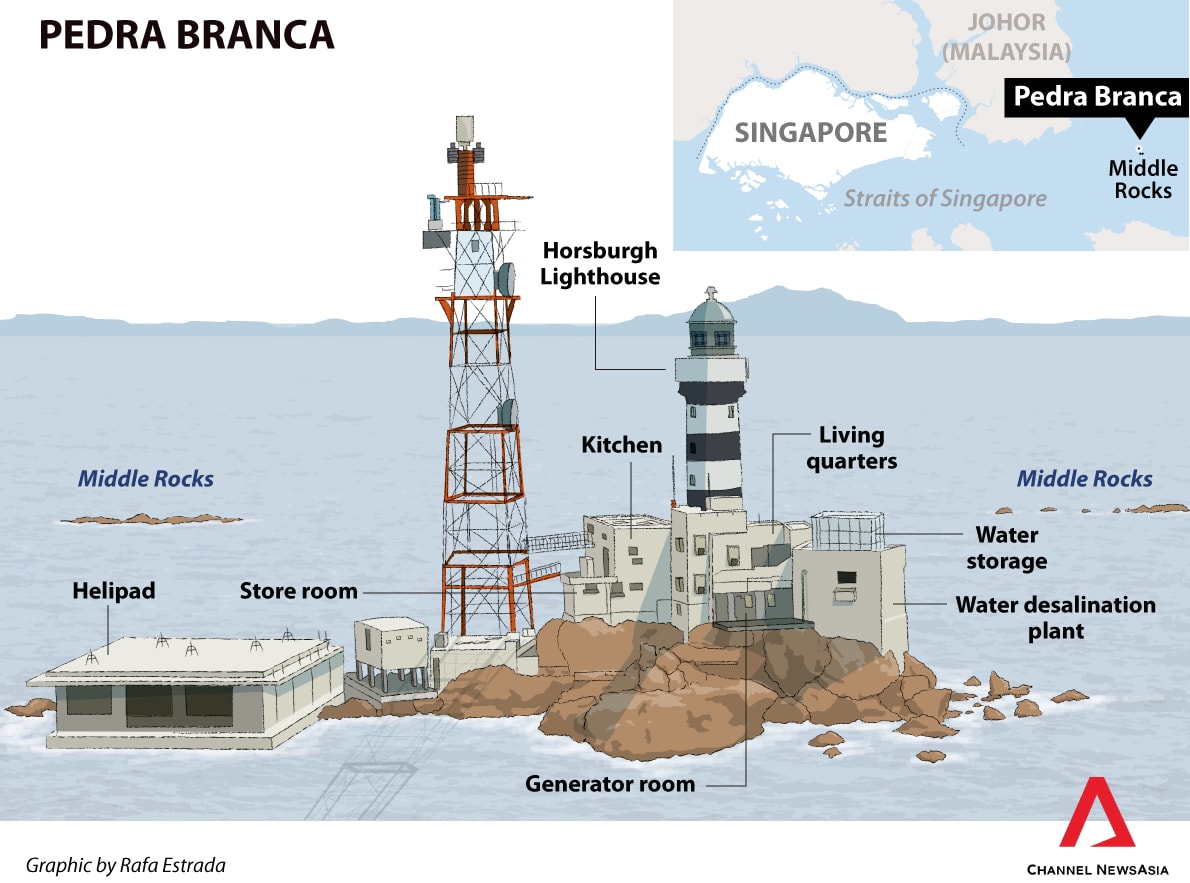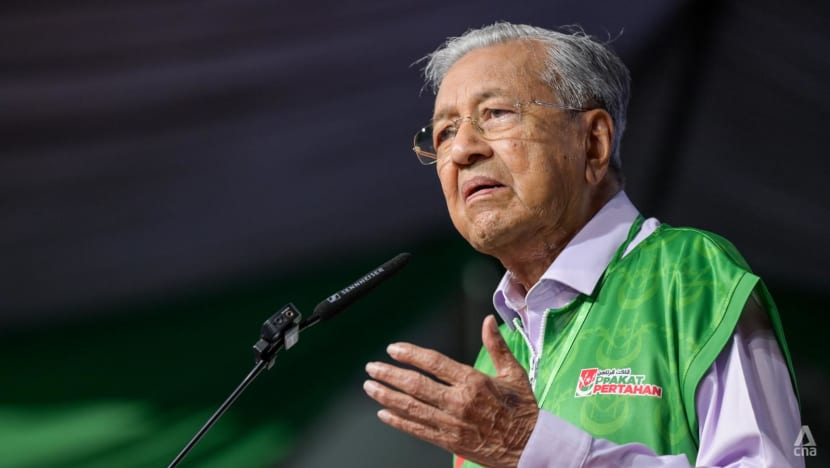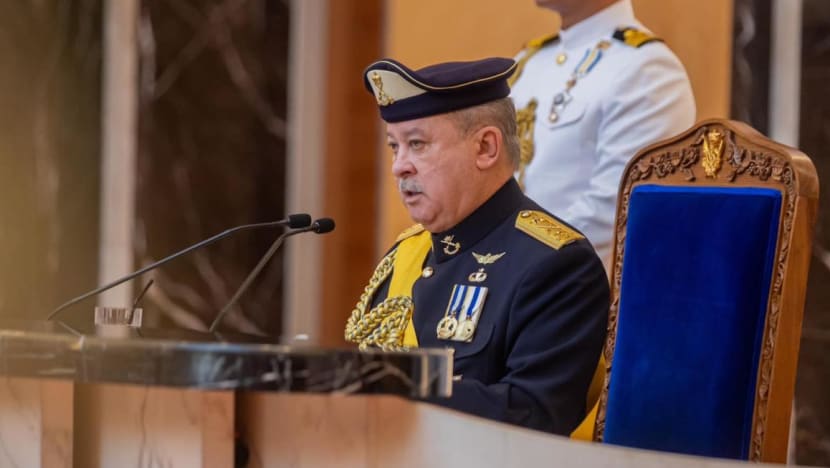CNA Explains: Why has Malaysia launched a royal inquiry into the Pedra Branca dispute?
What powers does a royal commission of inquiry have, and what are possible outcomes from its formation?

The International Court of Justice ruled in 2008 that Singapore had sovereignty over Pedra Branca. (File photo: CNA/Calvin Seah)

This audio is generated by an AI tool.
JOHOR BAHRU/SINGAPORE: Malaysia’s decision to set up a royal commission of inquiry (RCI) to study the handling of territorial disputes with Singapore regarding three islets has sparked international interest, with observers speculating over the reasons and timing of the probe.
What's the story behind the islands?
The three islets in question are Pedra Branca, an island which has a lighthouse, Middle Rocks, two uninhabited small rocks, as well as South Ledge, a low-tide elevation.
The dispute over Pedra Branca dates back to 1979, when Malaysia published a map indicating that the island was within the country's territorial waters. Pedra Branca is located near the eastern entrance of the Singapore Strait, about 44km east of mainland Singapore.
In 2008, the International Court of Justice (ICJ) ruled that Pedra Branca belongs to Singapore while Middle Rocks belongs to Malaysia. It also ruled that South Ledge belongs to the state in the territorial waters of which it is located.
Representatives of both governments, through a Joint Technical Committee, have continued to discuss the implementation of the judgment, including sovereignty over South Ledge.
More than a decade later, the ICJ ruling continues to be a sensitive subject for many Malaysians who feel that their government should be doing more to appeal the decision.

What is a royal commission of inquiry?
According to the Malaysian Bar, which regulates the legal profession, the RCI is a fact-finding body convened by the king on the advice of the Cabinet. It looks into matters of “considerable public importance” and controversy.
These include the conduct of government officers, public service departments or any issue concerning public welfare.
The commission typically consists of ex-judges tasked to inquire and turn their findings into a report. However, the RCI is not a court and does not have the power to charge individuals or impose sentences.
Legal expert Hafiz Hassan, who lectures law at Malaysia’s Multimedia University, told CNA that the RCI has the power to subpoena witnesses and compel key government officials to provide evidence under oath.
Since Malaysia’s independence in 1957, there have been 13 RCIs conducted on issues such as the discovery of mass graves of undocumented migrants in Perlis, the billion-dollar losses incurred by its Central Bank in the 1990s, as well as injuries sustained by current Prime Minister Anwar Ibrahim while he was in police custody in 1998.
The RCI findings have led to serious consequences in some instances. For example, the report on Mr Anwar’s injuries - including a black eye which later became the symbol of the Reformasi movement - concluded that Mr Anwar was beaten while under police custody.
A court subsequently found then-inspector-general of police Abdul Rahim Noor guilty of slapping, punching and karate-kicking Mr Anwar.
What led to the latest RCI?
In 2017, Malaysia filed an application for revision as well as a request for interpretation of the ICJ’s 2008 judgment on the sovereignty of Pedra Branca, Middle Rocks and South Ledge.
A decision to discontinue both applications was made shortly after the Pakatan Harapan coalition emerged victorious in Malaysia’s 14th General Election on May 10, 2018, and its leader Mahathir Mohamad was sworn in as prime minister.
A task force convened by the government in 2022 to look into this withdrawal tabled its final report on Jan 11, 2023.
After this, then Attorney-General Idris Harun said the government was of the view that Malaysia's 2018 decision was "not in order and improper" but he did not elaborate.
He added that his office was also studying recommendations from the task force, including an issue relating to "tort of misfeasance in public office", and would take appropriate action.
Misfeasance is a form of misconduct and occurs when a public official, public servant or public body knowingly acts to cause loss or harm to a third party.
Last Wednesday (Jan 14), the Chief Secretary to the Government Mohd Zuki Ali outlined that the RCI was convened to uncover why the federal government in 2018, under then Prime Minister Mahathir, withdrew the two applications to the ICJ.
How has Singapore responded?
Singapore's Ministry of Foreign Affairs (MFA) said last week that the inquiry was "an internal matter of Malaysia".
"We do not see this affecting the good bilateral relations between Singapore and Malaysia," said a spokesperson.
Singapore has said that it stands ready to "robustly defend" its sovereignty over Pedra Branca.
"After the Court's (ICJ's) decision, both Singapore and Malaysia publicly announced that they will accept and abide by the Court's decision which is final," said MFA in October 2022.
"In 2017, Malaysia instituted an application for revision and a request for interpretation of the Court's 2008 decision, which were subsequently withdrawn by Malaysia in 2018.
"Under the Statute of the Court, an application for revision cannot be made after the expiry of 10 years from the date of the Court's 2008 judgment, that is, May 2018."
What could be other reasons for the RCI?
Observers CNA spoke to outlined that the purpose of the RCI was not for Malaysia to again question the ICJ’s decision, but rather to uncover what truly happened in 2018 when the government decided not to pursue its appeal.
Political analyst Azmi Hassan, a senior fellow with the Nusantara Academy for Strategic Research, said the Pedra Branca issue had been settled by ICJ’s ruling and that Malaysia has likely missed the boat for any further appeals.
He submitted the possibility that the special task force convened in 2022 was unable to persuade Dr Mahathir or other senior civil servants to participate in its investigations - and thus unable to unearth the real reasons for the former two-time prime minister not following through on the appeal.
The RCI, a higher-level investigative body, could compel Dr Mahathir to testify, said Dr Azmi. “It’s possible that these are one of the terms of references for the RCI."
The terms of reference for an RCI is the objective and parameters of the inquiry, determined by the king on the advice of the Cabinet.
In June 2022, Dr Mahathir said he refused to cooperate in the task force investigations because it was chaired by Mohamed Apandi Ali, a former attorney-general who in 2017 said the Malaysia government was ready to appeal ICJ’s decision on Pedra Branca.
Dr Mahathir said that Mr Apandi could not act impartially in this case and that he would "cooperate" only after Mr Apandi was replaced.
Dr Azmi told CNA that many Malaysians remain "puzzled” by the 2018 decision made by the government under Dr Mahathir then.
“We want to know what went wrong during the process not to pursue the appeal against the ICJ and what went wrong during the court proceedings itself (in 2008),” said Dr Azmi.

Politics expert James Chin of the University of Tasmania echoed similar sentiments, pointing out that it was in the interest of many Malaysians for the federal government's handling of the matter to be divulged fully.
“I think this is one of those issues which the Malaysian public want a full accounting of,” he said.
“It's important for this issue to be investigated because many Malaysians were very surprised by the ICJ findings … and lots of people in Johor are unhappy that they lost the islands."
Analysts also speculated that the RCI may have been convened with the support of Johor's ruler, Sultan Ibrahim Iskandar, who will be appointed the country’s king on Wednesday.
Dr Azmi said Sultan Ibrahim has been vocal on the issue given the proximity of the disputed islands, and that he would likely be keen for the RCI to proceed.
“The selection of the commission will need to be recognised by the new Yang Di Pertuan Agong when he is elected … so I think yes, the timing of the convening of this RCI has something to do with the Sultan of Johor,” he added.
In June 2022, Sultan Ibrahim told the Johor State Assembly he was “bitterly disappointed” by the federal government’s decision to cancel the appeal of ICJ’s decision.
“The Johor state government was not consulted at all, especially given that it is a sovereign land of Johor. I want the government to act firmly against the individuals who acted against the rights of the state,” he said.
Deputy Prime Minister Ahmad Zahid Hamidi has said that while the Cabinet has approved the formation of the RCI, the appointment of its members will need consent from Sultan Ibrahim.
"It will only be executed with the formal appointment and swearing-in of the new king," said Dr Ahmad Zahid.

What are the possible outcomes?
The RCI will take some time to be formed and to deliberate and submit a report. After that, it can make recommendations to the attorney-general to charge individuals found to have committed criminal offences, analysts told CNA.
Some reports have speculated that the inquiry is part of Prime Minister Anwar’s plans to intensify persecution of prominent political and business figures who opposed him in the past.
Two sons of Dr Mahathir have been asked by the anti-corruption commission to declare their assets. Meanwhile, former finance minister Daim Zainudin, a close ally to Dr Mahathir, was charged on Monday for failing to comply with a notice to declare his assets for an anti-graft probe.
However, Professor Chin suggested that the issue of national sovereignty was bigger than Mahathir and that it was merely a “happy coincidence” that Anwar is prime minister as this RCI is convened.
Minister in the Prime Minister's Department (Law and Institutional Reform) Azalina Othman was quoted by Malaysian media as saying that a reason for the RCI may be for the government to learn from the errors of previous administrations.
"The issue of sovereignty cannot be decided by one person alone," she said.
Analysts also told CNA that the findings of the RCI may help the Malaysia government in bilateral talks on territorial disputes.
Dr Azmi posited that a primary focus for the RCI was to help Malaysia learn and gain input that may help the country in its ongoing negotiations with Singapore, including on the South Ledge feature.
The last meeting of the Malaysia-Singapore Joint Technical Committee that was reported publicly took place in November 2021.
Dr Azmi said: "We also want to know what went wrong so that we don’t make the same mistake in relation to the sovereignty of the South Ledge.”


















